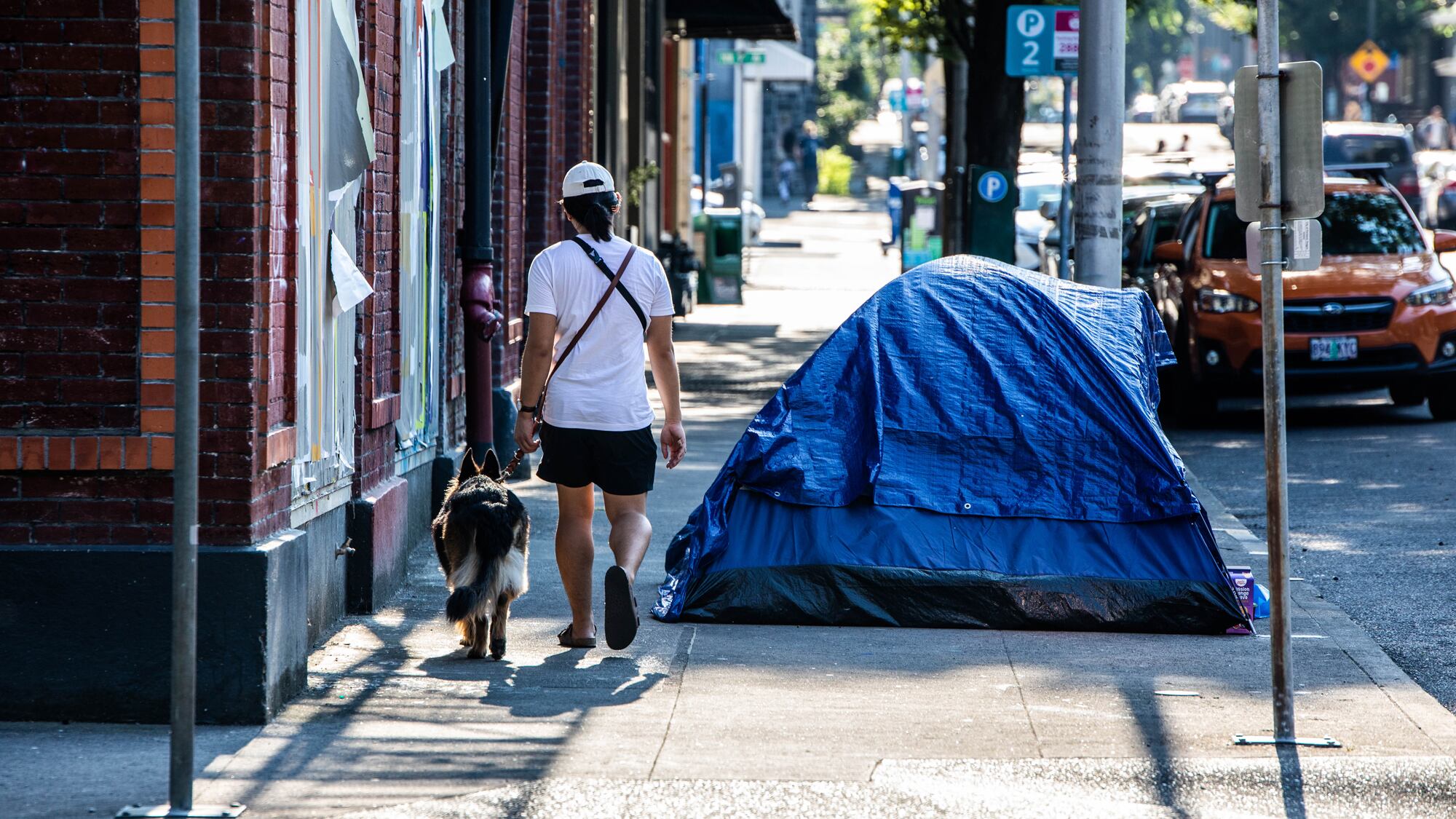The Portland City Council heard hours of acrimonious testimony Wednesday afternoon about Mayor Ted Wheeler’s plan to criminalize street camping, starting fires and leaving trash on city property.
Portlanders for and against Wheeler’s plan—a sweeping proposal that’s likely to pass at next week’s City Council meeting—offered impassioned speeches for more than four hours as the five council members sat in their chambers.
“Since announcing these changes, our office has received overwhelming positive support,” Wheeler said at the outset of the meeting, remarks that were met with sarcastic laughter from a portion of the gallery. “These changes are critical, and you may not agree, that’s fine, that’s democracy, to come into compliance with state law and vital to our community’s ability to return to the vibrant place that we love.”
The vote comes next week as Oregon cities seek to comply with a law passed by the Oregon Legislature in 2021 that requires them to formulate city ordinances that are “objectively reasonable as to time, place and manner with regards to persons experiencing homelessness.” The law requires cities to comply by July 1. The plan is also the latest in Wheeler’s response to growing frustration among Portlanders with the hundreds of homeless camps that dot the city.
The Portland city ordinance, if passed, would impose $100 fines or jail time of 30 days for offenders who violate camping rules three times. Among the violations that would draw prosecution: camping between the hours of 8 am and 8 pm, obstructing public streets and sidewalks, starting fires, using gas heaters, terracing the ground to make level spots for tents, and leaving garbage on city property.
Camping in certain areas is prohibited at all times: on pedestrian plazas and public docks; within 250 feet of a school, child care center or safe rest village; and in the public right of way along “high crash network streets and intersections” identified by the Portland Bureau of Transportation.
The ordinance would also crack down on chop shops that deal in stolen cars and bicycles. Anyone storing, assembling, disassembling or selling two or more cars or three or more bikes would be subject to prosecution. So would anyone storing or selling a car with the battery or tires removed.
Much of the several hours of impassioned testimony came from advocates for unhoused people who decried the ban as inhumane and pointless.
“It immediately will make you a criminal just being alive. You have 12 hours to be up, out, moving around, hustling your stuff back and forth. It leaves you prey to all kinds of surveillance,” said George McCarthy, who also called the plan nebulous. “Have a plan, at least, before you lay this hammer down on us.”
But others argued that the conditions on the streets had reached a breaking point. Eric Cole, speaking on behalf of a group of 20 commercial real estate companies, said his members were seeing “a humanitarian catastrophe” along their properties. “We are also, frankly, concerned about an economic catastrophe—for our entire region—if we don’t address the situation in our central core district,” he said. “A diminished central city has economic consequences for all our neighborhoods.”
Earlier on Wednesday, the council approved the settlement of a lawsuit brought by citizens with disabilities who claimed that the city had violated the American with Disabilities Act by allowing homeless camps to block sidewalks. Tiana Tozer and others brought the class action lawsuit in September.
Together, the two developments will make it much harder for unhoused people to set up semi-permanent camps on city property, where they proliferated during the pandemic.
Among the requirements of the class action settlement, which runs through June 30, 2028, the city must guarantee for five years that 40% of campsite removals each year be devoted to clearing sidewalks.
The city must also set up a 24-hour hotline for callers to report camps that obstruct rights of way; assess the reported campsites within five days; tell campers who are removed that they may not relocate on sidewalks; and post “no camping” signs in frequently obstructed areas.
The settlement bans the city from handing out tents and tarps, except during subfreezing weather or if the gear helps relocate campers. It requires the city to spend at least $8 million on camp clearing in the coming fiscal year, and $3 million in each of the four years thereafter. The city would have to clear at least 500 camps a year until there are no more to clear.


